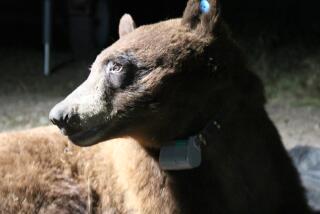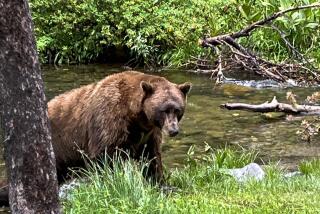He runs to get past terrifying experience
The bear is still there.
When Johan Otter runs through the city streets in Sunday’s Los Angeles Marathon, he will do so in unmarked clothes, a gentle gait, seemingly very much alone.
Yet he will have 400 pounds of company.
The giant grizzly he once fought to protect his daughter will be felt with every step.
“In many ways,” he says quietly, “the bear never left.”
The grizzly will be there in the simple cap he wears on his head.
During the attack at Montana’s Glacial National Park in 2005, the bear tore off nearly his entire scalp, virtually ending his ability to grow hair while necessitating the grafting of sensitive skin from his inner thigh.
“My head is bald and easily sunburned now, so I have to wear the cap, which is uncomfortable and warm,” he says. “Just one of the things that are different now.”
The grizzly also will be there in a right eye that, during the race, will be afflicted with double vision.
The bear tore his eye socket during the attack, and the muscle has never fully healed, so the eye gets tired around the 20-mile mark. “I’ll be the guy finishing the race with one eye closed,” he says.
Finally, the grizzly will be there in his face, which will spend much of the delightfully colorfully race staring down at the dark pavement.
The bear broke five vertebrae in the attack. Doctors rebuilt part of his neck and head with muscles from his back.
“My back is weak now, so I have to really be careful where I step,” he says. “Does it slow me down? I guess everything that happened with the bear slows me down.”
The attack still slows him down, yet somehow it lifts him up, the extraordinary feat of an ordinary man sorted out through footsteps moving forward.
Running gives him time to think through the attack’s ramifications, understand its changes, embrace its possibilities.
“It was impossible for me to fully comprehend all that happened with the bear,” he says. “Running has given me time to try to make sense of it.”
More than two years after fighting off the grizzly while tumbling down the side of a cliff, running has given him an equation that no attack will ever change.
The day he saved his daughter’s life, he lost a little bit of his own.
For 26.2 miles Sunday, he will find it again.
The more celebrated of the 25,000 athletes in Sunday’s common-man race are running for causes and cures.
Silently, Johan Otter is running for closure.
The more publicized athletes are running from something or to something.
Carefully, Johan Otter is running with something.
You won’t notice him. You can read this story and show up at the Universal Studios starting line Sunday and walk through the masses shouting his name and you’ll still never find him.
His clothing is nondescript and non-sponsored. He has turned down any offers by advertisers to publicize his national heroics.
His voice is friendly, but he doesn’t often engage in questioning about the scars and legs, for one simple reason.
He tells people the truth, and nobody believes him.
“People will say, ‘What happened to you?’ and I will say, ‘I was attacked by a grizzly,’ and the first thing they do is laugh,” he says. “They can’t comprehend it. I can’t comprehend it.”
You have probably heard at least something about the story. It is flashy enough to have been blared on televisions, real enough to be recounted around campfires, and stunning enough to be celebrated on the cover of Esquire men’s magazine.
In the course of protecting his family, has any man ever been braver and lived?
It was Aug. 25, 2005.
It was a high school graduation trip for Otter, 43, a hospital administrator from Escondido, and his 18-year-old daughter Jenna.
They were hiking the Grinnell Glacier Trail. Otter was a marathoner, his daughter was a dancer, it was a supposed to be a fun stroll through the wild.
Then, rounding the corner of a rocky cliff, they walked straight into a surprised grizzly sow and her two cubs.
Otter immediately jumped in front of Jenna as the grizzly lunged for them. The bear bit into his thigh and they began to wrestle.
Just as the grizzly was protecting her young, so Otter was protecting his young.
“Stay with me,” Otter thought. “Just don’t go to Jenna.”
To keep the bear from his daughter, Otter began rolling down the side of the cliff, the raging bear leaping after him.
They would tussle on several levels, Otter trying to choke the bear, the bear tearing off his scalp and cracking his back.
Eventually Otter landed in a spot where the bear couldn’t reach him. The bear then crawled back up to attack Jenna, who also had tumbled. She was curled up and playing dead. After a brief mauling, the bear walked away.
The daughter suffered a fractured back, broken tailbone and mauled shoulder, but today the only clear evidence of the attack is a small scar on her face.
The father, however, nearly died, and required three months in a hospital, most of it while wearing a painful halo for his broken neck.
During the entire time, while the world treated him like a hero, he prayed only for normalcy. He prayed only for the ability to run again.
When he finally tried it, four months later, he lasted only 10 minutes before losing his breath.
But they were 10 upright minutes, 10 clear-headed minutes, 10 minutes that would last forever. “I was sort of embarrassed,” he said. “And I felt sort of great.”
It might surprise you to know that Johan Otter trained for the Los Angeles Marathon at 4 a.m. along deserted San Diego roads that sometimes cut through the woods.
It will not surprise you that he was not scared.
“A coyote jumping in front of me doesn’t even phase me anymore,” he says. “Nothing I see down here will compare to what I faced up there.”
He has already reached one milestone in his several marathons since the accident, qualifying for this spring’s Boston Marathon. But he hasn’t come close to his personal best of 3:14, with a post-attack-best time of 3:29.
“It took a lot out of me,” says Otter.
Sometimes he runs through the silliest of regrets from that day. “Could I have done more? Should I have done more?” he says.
Other times, he runs through the most dumbfounding of realizations. “I think, ‘I can’t believe I’m here? Why am I still here?’ ” he says.
He runs through nightmares and sweet dreams and odd thoughts that somewhere, that bear is probably still out there.
When that memory starts working during the middle of Sunday’s race, at least there will be a new moment to ponder, one from earlier this week when he received the Marathon’s Patsy Choco Courage Award.
Jenna, a dance student at UC Irvine, has other commitments and will miss the race. But she was at the award ceremony, and her introduction made one thing clear.
The bear is still there. But so is his daughter.
“All girls say they have the best dad in the world,” she told the crowd, pausing. “I do have the best dad in the world.”
--
Bill Plaschke can be reached at [email protected]. To read previous columns by Plaschke, go to latimes.com/plaschke.
More to Read
Sign up for The Wild
We’ll help you find the best places to hike, bike and run, as well as the perfect silent spots for meditation and yoga.
You may occasionally receive promotional content from the Los Angeles Times.







